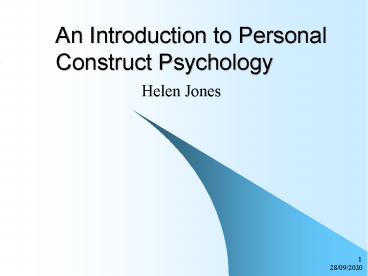An Introduction to Personal Construct Psychology - PowerPoint PPT Presentation
Title:
An Introduction to Personal Construct Psychology
Description:
A brief overview of the key features of George Kelly's work The Psychology of ... We CIRCUMSPECT (C) (collect data/information) ... – PowerPoint PPT presentation
Number of Views:504
Avg rating:3.0/5.0
Title: An Introduction to Personal Construct Psychology
1
An Introduction to Personal Construct Psychology
- Helen Jones
2
Introduction
- A brief overview of the key features of George
Kellys work The Psychology of Personal
Constructs (Norton, 1955 - A theory that helps people to make sense of their
personal perspectives and values and to
understand other peoples points of view
3
Constructive Alternativism
- Basic Postulate A persons processes are
psychologically channelised by the ways in which
(s)he anticipates events. - The person as scientist
- All behaviour is an experiment
- Validation or invalidation are equally useful
4
Four Points of View
- Listen to yourself so that you can suspend your
views - Listen to others, in their own terms
- Listen to, and check out, the implications of the
words you hear - Take responsibility for predicted outcomes
Text
Text
Text
Text
Text
Text
Text
Text
Text
5
Self Reflexivity
- A theory of personality which is not applicable
to the person practising it is not likely to
apply to relate well to others either! - It is PERSONAL
6
The credulous approach
- The credulous approach implies a belief in what
the other person says is true for them and viable
for them. - The approach implies work on the part of the
listener to suspend his or her own personal
perspectives in order to understand the theories
of the other person
7
Some assumptions behind Kellys theory of
personality
- There is an integral universe
- No one person has direct access to it
- Each individual has a unique personal construct
system which makes total sense to that individual - We share some common understandings
8
Assumptions - continued
- We tend to see the world through sets of filters
seeing some things as alike and thereby
different from others - We differ in the ways we make discriminations
- All our ways of seeing things are linked
internally in a hierarchical fashion
9
More assumptions.
- We communicate with others only when we begin to
understand their value systems as well as our own - Our core beliefs are few and highly resistant to
change - Organisations have their core structures as do
individuals understanding this helps
10
Creativity and Decision Making
- Kelly describes creativity as the constant
weaving between LOOSENING (vague thoughts and
ideas) and TIGHTENING (making things happen) - A human tragedy is to live only one, or other, of
these aspects of the cycle
11
Decision Making
- Kelly describes this as the CPC Cycle
- We CIRCUMSPECT (C) (collect data/information)
- We PREEMPT (P) (make decisions) anticipating that
the outcome will allow us - CHOICE/CONTROL(C) over our immediate and longer
term futures
12
PCP and emotion transitional constructs
- Kelly suggests that we are nothing but a bundle
of constructs rolling along in time and space - So emotion is not separate from thinking it is
more the awareness of the need to reconstrue a
heightened awareness of ones own construct
system - Kelly chooses to use the term transition a
change of gear
13
Kellys Emotional vocabulary
- Guilt is a dislodgement of the self from ones
core constructs - Threat is an awareness of an imminent change in
ones core constructs - Anxiety is an awareness that one does not
immediately have the constructs available to deal
with a particular situation
14
More emotional vocabulary
- Aggression ( more akin to assertiveness these
days) is an active elaboration of a persons
perceptual field doing things in a consciously
different way - Hostility (more like cooking the books) is an
attempt to extort evidence in favour of a social
prediction which has not worked
15
Further references
- The Psychology of Personal Constructs George
Kelly, latest edition 18/12/00Wiley, 1991 - A Psychology for Living Peggy Dalton and Gavin
Dunnett, Wiley, 1992 - Inquiring Man Don Bannister and Fay Fransella,
Penguin, 1971































